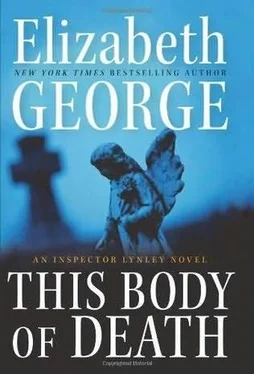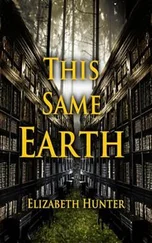Isabelle preceded Lynley into the room, which took most of its illumination from an enormous skylight that comprised the greater part of the ceiling. Beneath this, a redheaded woman knelt on the floor sopping up liquid. Her gaunt-faced companion stood nearby, a few towels in his hands. These he passed to her as she said, “Two more and I think we’ve got it. Lord, what a mess.”
She could have been referring to the room itself, which looked like the den of a mad scientist, with worktables cluttered with files and documents being blown about by fans that stood in the room’s two windows in a futile attempt to mitigate the heat. There were bookshelves crammed with journals and volumes, racks of tubes and beakers and pipettes, three computers, china boards, video machines, television monitors. Isabelle couldn’t imagine how anyone was able to function in the place.
Neither, apparently, could Lynley, for he looked round, said, “Ah,” and exchanged a look with the man whom he introduced as Simon St. James. The woman was St. James’s wife, Deborah, and Isabelle recognised the name as that of the photographer who’d taken the portrait of Jemima Hastings. She recognised St. James’s name as well. He was a longtime expert witness, an evaluator of forensic data who worked equally for the defence or for the prosecution when a case of homicide came to trial. She could tell from their interaction that Lynley knew Simon and Deborah St. James rather well, and she wondered why he had wanted her to meet them.
St. James said to Lynley, “Yes, as you see,” in answer to his ah. He employed an even tone in which something about the state of the room was communicated between them.
Beyond this workplace, a second door opened into what was apparently a darkroom, and it was from this space that liquid pooled out. Fixer, Deborah St. James explained as she finished mopping it up. She’d spilled an entire gallon of the stuff. “One never spills when a container is nearly empty, have you noticed?” she asked. Job done, she stood and shook back her hair. She reached in the pocket of the bib overalls she was wearing-these were olive linen, wrinkled, and they suited her in ways that would have seemed ridiculous on another woman-and she brought out an enormous hair slide. She was the kind of woman who could gather up her hair in a single deft movement and make it look fashionably disheveled. She wasn’t at all beautiful, Isabelle thought, but she was natural and that was her appeal.
That she appealed to Lynley was something he didn’t hide. He said, “Deb,” and hugged her, kissing her on the cheek. Briefly, Deborah’s fingers touched the back of his neck. “Tommy,” she said in reply.
St. James watched this, his face perfectly unreadable. Then he removed his gaze from his wife and Lynley to Isabelle and said lightly, “How’re you getting on with the Met, then? You’ve been thrown in feetfirst, I dare say.”
“I suppose that’s better than headfirst,” Isabelle replied.
Deborah said, “Dad’s doing us drinks. Did he offer you…? Well, of course he did. Let’s not have them up here. There’s got to be air in the garden. Unless…” She looked from Lynley to Isabelle. “Is this business, Tommy?”
“It can be done in the garden as easily as here.”
“With me? With Simon?”
“Simon this time,” and to St. James, “if you’ve a moment. It shouldn’t take long.”
“I was finished here anyway.” St. James looked round the room and added, “She had the maddest system of organising things, Tommy. I swear to you, I still can’t work it out.”
“She meant to be indispensable to you.”
“Well, she was that.”
Isabelle looked between them once again. Some sort of code, she reckoned.
Deborah said, “It’ll come right eventually, don’t you think?” but it seemed that she wasn’t speaking of the files. Then she smiled at Isabelle and said, “Let’s get out of here.”
The little dog had settled on a tattered blanket in one corner of the room, but she heroically scuttled back down the stairs she’d just come up when she realised their intentions. At the ground floor, Deborah called, “Dad, we’re going to the garden,” and Joseph Cotter replied, “Be there in a tic, then,” from the study where the sound of glass clinking against metal suggested that drinks were being placed on a tray.
The garden comprised lawn, brick patio, herbaceous borders, and an ornamental cherry tree. Deborah St. James led Isabelle to a table and chairs beneath this, chatting about the weather. When they’d sat, she changed gears, directing a long look at Isabelle. “How’s he getting on?” she asked frankly. “We worry about him.”
Isabelle said, “I’m not the best judge, as I’ve not worked with him before. He seems to be doing perfectly well as far as I can tell. He’s very kind, isn’t he?”
Deborah didn’t reply at first. She gazed at the house as if seeing the men within it. After a moment she said, “Helen worked with Simon. Tommy’s wife.”
“Did she? I’d no idea. She was a forensic specialist?”
“No, no. She was…Well, she was rather uniquely Helen. She helped him when he needed her, which usually worked out to be three or four times each week. He misses her terribly, but he won’t talk about it.” She removed her gaze from the house back to Isabelle. “Years ago, they intended to marry-Simon and Helen-but they never did. Well, obviously, they didn’t,” she added with a smile, “and Helen eventually married Tommy. Bit of a difficult situation, isn’t it, making the change from lovers to friends.”
Isabelle didn’t ask why Lynley’s wife and Deborah’s husband had not married. She wanted to do so, but the arrival of the two men supervened, and on their heels came Joseph Cotter with the tray of drinks and the household dog who bounded across the lawn with a yellow ball in her mouth that she proceeded to chew on, plopping herself at Deborah’s feet.
More conversation about the weather followed, but soon enough, Lynley brought up the ostensible reason for this visit to Chelsea. He handed to Simon the manila envelope he’d been carrying in Isabelle’s office. Simon opened it and drew out its contents. Isabelle saw it was the photograph of the yellow shirt from the Oxfam bin.
“What d’you make of it?” Lynley asked his friend.
St. James studied it for a minute in silence before he said, “I should think it’s arterial blood. The pattern on the front of the shirt? It’s a spray.”
“Suggesting?”
“Suggesting this was worn by the killer, and he stood quite close to the victim when he struck the fatal blow. Look at the spray on the collar of the shirt.”
“What d’you reckon that means?”
St. James thought about this, his expression distant. He responded with, “Oddly enough…? I’d say in the midst of an embrace. Anything else and the heaviest spray would surely be on the sleeve, not on the collar and the front of the shirt. Let me show you. Deborah?”
He rose from his chair, no easy business for him because he was disabled. Isabelle hadn’t noticed this earlier. He wore a leg brace, which made his movements awkward.
His wife rose as well and stood as directed by her husband. He put his left arm round her waist and drew her to him. He bent as if to kiss her, and as he did so, he lifted his right hand and brought it down on her neck. The demonstration completed, he touched his wife lightly on the hair and said to Lynley with an indication of the photo, “You can see the heaviest part of the spray is high on the right breast of the shirt. He’s taller than she was, but not by much.”
“Not a defensive wound on her, Simon.”
“Suggesting she knew him well.”
“She was there with him willingly?”
Читать дальше












